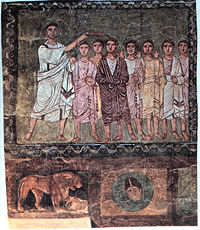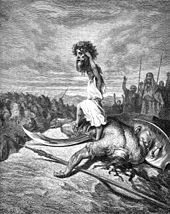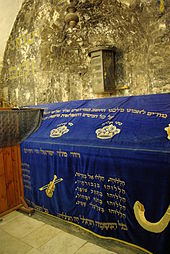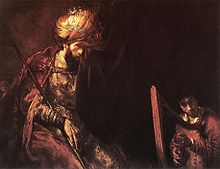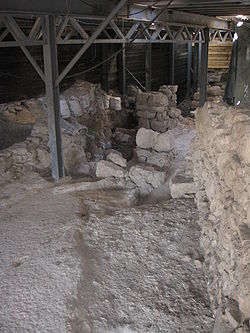- David
-
This article is about the biblical king. For other uses, see David (disambiguation)."Daud", "Dawood", and "King David" redirect here. For other uses, see Daud (disambiguation), Dawood (disambiguation), and King David (disambiguation).
King David King of Israel 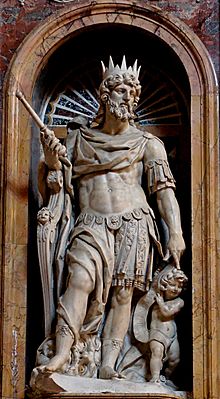
Statue of David by Nicolas Cordier, in the basilica of Santa Maria Maggiore, RomeReign over Judah c. 1010–1003 BC; over Judah and Israel c. 1003–970 BC Born c. 1040 BC Birthplace Bethlehem Died c. 970 BC Place of death Jerusalem Predecessor Saul (Judah), Ish-bosheth (Israel) Successor Solomon Consort Michal, Ahinoam, Abigail, Maachah, Haggith, Abital, Eglah, Bathsheba and Abishag Royal House House of David (new house) Father Jesse Mother not named in the Bible; identified by the Talmud as Nitzevet, daughter of Adael. David (Hebrew: דָּוִד, דָּוִיד, Modern David Tiberian Dāwîḏ; ISO 259-3 Dawid; Strong's Daveed; beloved; Arabic: داوود or داود[note A] Dāwūd) was the second king of the united Kingdom of Israel according to the Hebrew Bible and, according to the Gospels of Matthew and Luke, an ancestor of Jesus Christ through both Saint Joseph and Mary. He is depicted as a righteous king, although not without fault, as well as an acclaimed warrior, musician and poet, traditionally credited for composing many of the psalms contained in the Book of Psalms.
Edwin Thiele dates his life to c. 1040–970 BC, his reign over Judah c. 1010–1003 BC, and his reign over the united Kingdom of Israel c. 1003–970 BC.[1] The Books of Samuel, 1 Kings, and 1 Chronicles are the only source of information on his life and reign; the Tel Dan stele may record the existence in the mid-9th century of a Judean royal dynasty called the "House of David", although this is disputed.
David's life is very important to Jewish, Christian, and Islamic culture. In Judaism, David, or David HaMelekh, is the King of Israel, and the Jewish people. A direct descendant of David will be the Messiah. In Islam, he is known as Dawud, considered to be a prophet and the king of a nation.
Contents
Biblical narrative
David is chosen of God
God withdrew his favour from Saul, king of Israel. It repenteth me that I have set up Saul to be king: for he is turned back from following me, and has not performed my commandments. 1 Samuel 15:11 The prophet Samuel seeks a new king from the sons of Jesse of Bethlehem. Seven of Jesse's sons pass before Samuel, but Samuel says "The LORD has not chosen these." He then asks "Are these all the sons you have?" and Jesse answers, "There is still the youngest but he is tending the sheep." David is brought to Samuel, and "the LORD said, 'Rise and anoint him; he is the one.'"[2]
David at the court of Saul
God sends an evil spirit to torment Saul,1 Samuel 16:14, and his attendants suggest he send for David, a young warrior famed for his bravery and for his skill with the harp. Saul does so and makes David one of his armor-bearers and "whenever the spirit from God came upon Saul, David would take his harp and play. Then relief would come to Saul; he would feel better, and the evil spirit would leave him."
David and Goliath
The Israelites, under King Saul, face the Philistines in the Valley of Elah. The boy David is bringing food to his older brothers who are with Saul. He hears the Philistine giant Goliath challenging the Israelites to send their own champion to decide the outcome in single combat. David tells Saul he is prepared to face Goliath and Saul allows him to make the attempt. He is victorious, striking Goliath in the forehead with a stone from his sling. Goliath falls, and David kills him with his own sword and beheads him; the Philistines flee in terror. Saul sends to know the name of the young champion, and David tells him that he is the son of Jesse.[3]
King Saul and David
Main article: David and JonathanSaul makes David a commander over his armies and offers him his daughter Michal in marriage for bringing more than 200 foreskins of the Philistines to him. David is successful in many battles, and his popularity awakes Saul's fears — "What more can he have but the kingdom?" By various stratagems the jealous king seeks his death, but the plots only endear David the more to the people, and especially to Saul's son Jonathan, who loves David (1 Samuel 18:1, 2 Samuel 1:25-26).[4][5] Warned by Jonathan, David flees into the wilderness, where he gathers a band of followers and becomes the champion of the oppressed while evading the pursuit of Saul. He accepts the town of Ziklag as a chief from the Philistine king Achish of Gath, but continues secretly to champion the Israelites. Achish marches against Saul, but David is excused from the war on the accusation of the Philistine nobles that his loyalty to their cause cannot be trusted.
David becomes king
Jonathan and Saul are killed in battle with the Philistines at Mount Gilboa. David mourns their deaths, especially that of Jonathan, his friend, and then goes up to Hebron, where he is anointed king over Judah; in the north, Saul's son Ish-Bosheth is king of the tribes of Israel. War ensues between Ish-Bosheth and David, until Ish-Bosheth is murdered. The assassins bring the head of Ish-Bosheth to David hoping for reward, but David executes them for their crime against the Lord's anointed. Yet with the death of the son of Saul, the elders of Israel come to Hebron, and David who was 30 years old, is anointed King over Israel and Judah.[6]
Jerusalem and the Davidic Covenant
David conquers the Jebusite fortress of Jerusalem, and makes it his capital, and "Hiram king of Tyre sent messengers to David, and cedar trees, also carpenters and masons who built David a house." David brings the Ark of the Covenant to Jerusalem, intending to build a temple, but God, speaking to the prophet Nathan, forbids it, saying the temple must wait for a future generation. God makes a covenant with David, promising that he will establish the house of David eternally: "Your throne shall be established forever."
With God's help, David is victorious over his people's enemies. The Philistines are subdued, the Moabites to the east pay tribute, along with Hadadezer of Zobah, from whom David takes gold shields and bronze vessels.[7]
Bathsheba and Uriah the Hittite
David commits adultery with Bathsheba, the wife of Uriah the Hittite.[8] Bathsheba becomes pregnant. David sends for Uriah, who is with the Israelite army at the siege of Rabbah, so that he may lie with his wife and conceal the identity of the child's father. Uriah refuses to do so while his companions are in the field of battle and David sends him back to Joab, the commander, with a message instructing him to abandon Uriah on the battlefield, "that he may be struck down, and die." David marries Bathsheba and she bears his child, "but the thing that David had done displeased the Lord."[9] The prophet Nathan confronts David, saying: "Why have you despised the word of God, to do what is evil in his sight? You have smitten Uriah the Hittite with the sword, and have taken his wife to be your wife." Nathan presents three punishments from God for this sin. First, that the "sword shall never depart from your house" (2 Samuel 12:10) second, that "Before your very eyes I will take your wives and give them to one who is close to you, and he will sleep with your wives in broad daylight. 12 You did it in secret, but I will do this thing in broad daylight before all Israel., (2 Samuel 12:12) and finally, that "the son born to you will die" (2 Samuel 12:14). David repents, yet God "struck the [David's] child ... and it became sick ... [And] on the seventh day the child died." David leaves his lamentations, dresses himself, and eats. His servants ask why he wept when the baby was alive, but ends his mourning when the child dies. David replies: "While the child was still alive, I fasted and wept. I thought, 'Who knows? The Lord may be gracious to me and let the child live.' But now that he is dead, why should I fast? Can I bring him back again? I will go to him, but he will not return to me." (2 Samuel 12:22-23, New International Version).
David's son Absalom rebels
David's son Absalom rebels against his father, and they come to battle in the Wood of Ephraim. Absalom is caught by his hair in the branches of an oak and David’s general Joab kills him as he hangs there.[10] When the news of the victory is brought to David, he does not rejoice, but is instead shaken with grief: "O my son Absalom, my son, my son Absalom! Would I had died instead of you, O Absalom, my son, my son!"[11]
The old age of David
When David has become old and bedridden, Adonijah, his eldest surviving son and natural heir, declares himself king. Bathsheba, David's favorite wife, and Nathan the prophet, fearing that they will be killed by Adonijah, go to David and procure his agreement that Solomon, Bathsheba's son, should sit on the throne. And so the plans of Adonijah collapse, and Solomon becomes king.[12] It is to Solomon that David gives his final instructions, including his promise that the line of Solomon and David will inherit the throne of Judah forever, and his request that Solomon kill his oldest enemies on his behalf.[13] David dies and is buried in the City of David, having ruled forty years over Israel, seven in Hebron and thirty-three in Jerusalem.
David the Musician
See also: History of music in the Biblical period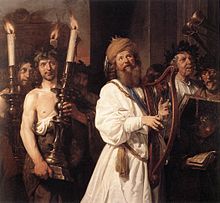 "David Playing the Harp" by Jan de Bray, 1670
"David Playing the Harp" by Jan de Bray, 1670
In various biblical passages, David is referred to as “the favorite of the songs of Israel,”[14] the one who soothed Saul with music,[15] and the founder of Temple singing.[16][17] A Psalms scroll from the Dead Sea Scrolls (11QPsa) attributes 3600 tehilim (songs of praise) plus other compositions to David.[18] Seventy-three of the 150 Psalms in the Bible are attributed to David.[19] The supreme kingship of Yahweh is the most pervasive theological concept in the book of Psalms,[20][21] and many psalms attributed to David are directed to Yahweh by name,[22] whether in praise or petition, suggesting a relationship.[23] According to the Midrash Tehillim, King David was prompted to the Psalms by the Holy Spirit that rested upon him.[24]
In addition to ascribing authorship to David, several Psalms are identified with specific events in David’s life.[25] Psalm 34 is attributed to David on the occasion of his escape from the Abimelech (king) Achish by pretending to be insane.[26] According to the narrative in 1 Samuel 21, instead of killing the man who had exacted so many casualties from him, Abimelech allows David to depart, exclaiming, “Am I so short of madmen that you have to bring this fellow here to carry on like this in front of me? Must this man come into my house?"[27] Psalm 34 is one of seven acrostic Psalms in the original Hebrew; most English translations do not retain the acrostic form.[28] The first part of Psalm 34 is directed toward Yahweh in complete and humble gratitude (David does not even mention his own royal status); the second part confidently directs others to Yahweh.[29]
This poor man cried, and the LORD heard him, and saved him out of all his troubles. The angel of the Lord encamps around those who fear him, and delivers them … Come, O children, listen to me; I will teach you the fear of the Lord.
— Psalm 34:6-7,11 (ESV)
In contrast, Psalm 18 is not related to a specific incident but rather to God’s faithful deliverance from “all of his enemies and from the hand of Saul.”[30][31] The text of this Psalm was thought to date to the 10th century BC even before the discovery of the Dead Sea Scrolls[32] and is very similar to that of 2 Samuel 22.[33] In this Psalm, David recalls being in deadly situations: “The cords of death entangled me, the torrents of destruction overwhelmed me.”[34] He cries out to God for help, and God rescues David.
I love you, O LORD, my strength. The LORD is my rock, my fortress and my deliverer; my God is my rock, in whom I take refuge. He is my shield and the horn of my salvation, my stronghold. I call to the LORD, who is worthy of praise, and I am saved from my enemies.
— Psalm 18:1-3 (NIV)
The Scottish theologian Samuel Rutherford (1600–1661) notes that crying out to God is mentioned in many Psalms attributed to David.[35] He comments, “Fervour is a heavenly ingredient in prayer. An arrow drawn with full strength hath a speedier issue.” [36] The Midrash Tehillim teaches from Psalm 4 “that the mere mechanical application to the Throne of Mercy is not efficacious is plainly seen from the words of King David, who says God is nigh to all that call upon Him, and … he adds the important words, 'to those who call upon Him in truth.'”[37]
According to Psalm 40, David’s cries to God were heartfelt though not necessarily impatient; the poignant combination of a cry for help with a confident expression of faith echo today in the song “40” by the rock group U2 and that encapsulates David’s experience with his God:
I waited patiently for the Lord; he turned to me and heard my cry. He lifted me out of the slimy pit, out of the mud and mire; he set my feet on a rock and gave me a firm place to stand. He put a new song in my mouth, a hymn of praise to our God. Many will see and fear and put their trust in the Lord.
— Psalm 40:1-3 (NIV)
Religions and David
David in Judaism
The traditional tomb of David in Jerusalem, actually a Crusader tomb.[38]
King David the Prophet 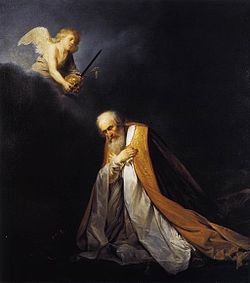
King David in Prayer, by Pieter de Grebber (c. 1640)Holy Monarch, Prophet, Reformer, Spiritual Poet & Musician, Vicegerent of God, Psalm-Receiver Born c. 1040 B.C.E.
BethlehemDied c. 970 B.C.E.
JerusalemHonored in Judaism
Christianity
IslamAttributes Psalms, Harp, Head of Goliath David is an important figure in Judaism. Historically, David's reign represented the formation of a coherent Jewish kingdom centered in Jerusalem. David is an important figure within the context of Jewish messianism. In the Hebrew Bible, it is written that a human descendant of David will occupy the throne of a restored kingdom and usher in a messianic age.
David is also viewed as a tragic figure; his acquisition of Bathsheba, and the loss of his son are viewed as his central tragedies.
Many legends have grown around the figure of David. According to one Rabbinic tradition, David was raised as the son of his father Jesse and spent his early years herding his father's sheep in the wilderness while his brothers were in school. Only at his anointing by Samuel - when the oil from Samuel's flask turned to diamonds and pearls - was his true identity as Jesse's son revealed. David's adultery with Bathsheba was only an opportunity to demonstrate the power of repentance, and some Talmudic authors stated that it was not adultery at all, quoting a Jewish practice of divorce on the eve of battle. Furthermore, according to David's apologists, the death of Uriah was not to be considered murder, on the basis that Uriah had committed a capital offence by refusing to obey a direct command from the King.[39]
According to midrashim, Adam gave up 70 years of his life for the life of David.[40] Also, according to the Talmud Yerushalmi, David was born and died on the Jewish holiday of Shavuot (Feast of Weeks). His piety was said to be so great that his prayers could bring down things from Heaven.
David in Christianity
Originally an earthly king ruling by divine appointment ("the anointed one", as the title Messiah had it), the "son of David" became in the last two pre-Christian centuries the apocalyptic and heavenly one who would deliver Israel and usher in a new kingdom. This was the background to the concept of Messiahship in early Christianity, which interpreted the career of Jesus "by means of the titles and functions assigned to David in the mysticism of the Zion cult, in which he served as priest-king and in which he was the mediator between God and man."[41] The early Church believed that "the life of David [foreshadowed] the life of Christ; Bethlehem is the birthplace of both; the shepherd life of David points out Christ, the Good Shepherd; the five stones chosen to slay Goliath are typical of the five wounds; the betrayal by his trusted counsellor, Achitophel, and the passage over the Cedron remind us of Christ's Sacred Passion. Many of the Davidic Psalms, as we learn from the New Testament, are clearly typical of the future Messiah."[42] In the Middle Ages, "Charlemagne thought of himself, and was viewed by his court scholars, as a 'new David'. [This was] not in itself a new idea, but [one whose] content and significance were greatly enlarged by him."[43] The linking of David to earthly kingship was reflected in later Medieval cathedral windows all over Europe through the device of the Tree of Jesse, its branches demonstrating how divine kingship descended from Jesse, through his son David, to Jesus.
Western Rite churches (Roman Catholic, Lutheran) celebrate his feast day on 29 December, Eastern-rite on 19 December.[44] The Eastern Orthodox Church and Eastern Catholic Church celebrate the feast day of the "Holy Righteous Prophet and King David" on the Sunday of the Holy Forefathers (two Sundays before the Great Feast of the Nativity of the Lord), when he is commemorated together with other ancestors of Jesus. He is also commemorated on the Sunday after the Nativity, together with Joseph and James, the Brother of the Lord.
David in Islam
Main article Islamic view of David
David (Arabic داود, Dāwūd) is a highly important figure in Islam as one of the major prophets sent by God to guide the nation of Israel. David is mentioned several times in the Qur'an, often with his son Solomon. In the Qur'an: David kills Goliath (II: 251) and God grants him kingship and wisdom and enforces it (XXXVIII: 20). David is made God's "vicegerent on earth" (XXXVIII: 26) and God further gives David sound judgment (XXI: 78; XXXVII: 21-24, 26) as well as the Psalms, which are regarded as books of divine wisdom (IV: 163; XVII, 55). The birds and mountains unite with David in ushering praise to God (XXI: 79; XXXIV: 10; XXXVIII: 18), while God instructs David in the art of fashioning chain-mail out of iron (XXXIV: 10; XXI: 80). Together with Solomon, David gives judgment in a case of damage to the fields (XXI: 78) and David judges in the matter between two disputants in his prayer chamber (XXXVIII: 21-23). There is no mention in the Qur'an of the wrong David did to Uriah nor is there any reference to Bathsheba, and therefore Muslims reject this narrative.[45]
Muslim tradition and the hadith stress David's zeal in daily prayer[46] as well as in fasting. Qur'an commentators, historians and compilers of the numerous Stories of the Prophets elaborate upon David's concise Qur'anic narratives and specifically mention David's gift in singing his Psalms as well as his beautiful musical and vocal talents. His voice is described as having had a captivating power, weaving its influence not only over man but over all beasts and nature, who would unite with him to praise God.[47]
David in Baha'i Faith
David is described as a minor prophet who came in the shadow of the dispensation of Moses to develop and consolidate the process he set in motion.[48]
David in the LDS Faith
The Doctrine and Covenants of The Church of Jesus Christ of Latter-day Saints cites David as one directed by God to practise polygamy, but who sinned in committing adultery with Bathsheba and having Uriah killed.[49] The LDS doctrine is that polygamy is allowed only as directed by the Lord, otherwise it is a grievous sin. Since 1898 the LDS church has prohibited the practice of polygamy by its members.[50]
Historicity of David
See The Bible and history and dating the Bible for a more complete description of the general issues surrounding the Bible as a historical source.
Archaeological evidence
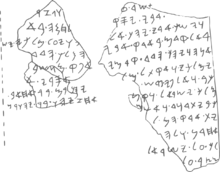 The Tel Dan Stele
The Tel Dan Stele
Tel Dan Stele and Mesha Stele
A fragment of an Aramaean victory stele discovered in 1993 at Tel Dan and dated c.850-835 BC contains a phrase ביתדוד (bytdwd). Because ancient Aramaic script does not contain vowels, different readings are possible. Scholars agree that the first part should be read בֵּית (beyt), meaning "house". However, the second part can be read as 1) דּוֹד (dod), which means "uncle" or "beloved" or as 2) דָּוִד (David). The phrase therefore can mean either "House of the beloved", "House of the uncle" or "House of David".[51] Since the stele recounts the victory of an Aramean king over "the king of Israel", [52] the translation of "ביתדוד" as "the House of David" is not illogical.[53][54] The Mesha Stele from Moab, dating from approximately the same period, may also contain the name David, in two places: in line 12, where the interpretation is uncertain, and בת[ד]וד in line 31, where one destroyed letter must be supplied (here it is bracketed in the middle).[55] Kenneth Kitchen has proposed that an inscription of c. 945 BC by the Egyptian Pharaoh Shoshenq I mentions "the highlands of David."[56] Although a reference to King David in this geographical name is not certain, some scholars suggest it is reasonable.[57]
City of David and Judah, ca. 1000 BC onward
Main article: City of DavidPart of the Large Stone Structure thought by some archaeologists to be the remains of King David's Palace.
The Bronze and Iron Age remains of the City of David, the original urban core of Jerusalem identified with the reigns of David and Solomon, were investigated extensively in the 1970s and 1980s under the direction of Yigal Shiloh of the Hebrew University, but failed to discover significant evidence of occupation during the 10th century BC,[58] In 2005, Eilat Mazar found a Large Stone Structure which she claimed was David's Palace, but the archaeology is contaminated and impossible to date accurately.[59][60] Finkelstein and Silberman feel the archaeological evidence from surface surveys indicates that Judah at the time of David was a small tribal kingdom, although both do accept that David and Solomon were likely historical figures in Judah about the 10th century BC. They describe the earliest tales of David as a "classical bandit tale".[61]
The biblical account
The biblical account about David comes from the book of Samuel and the book of Chronicles (both of which are divided into two books in Jewish and Christian traditions). (Although almost half of the Psalms are headed "A Psalm of David", the headings are later additions, and no psalm can be attributed to David with certainty).[62] Chronicles merely retells Samuel from a different theological vantage point, and contains little if any information not available there, and the biblical evidence for David is therefore dependent almost exclusively on the material contained in the chapters from 1 Samuel 16 to 1 Kings 2.
Since Martin Noth put forward his analysis of the Deuteronomistic History, biblical scholars have accepted that these two books form part of a continuous history of Israel, compiled no earlier than the late 7th century BC, but incorporating earlier works and fragments. Samuel's account of David "seems to have undergone two separate acts of editorial slanting." The original writers show a strong bias against Saul, and in favour of David and Solomon. Many years later, the Deuteronomists edited the material in a manner that conveyed their religious message, inserting reports and anecdotes that strengthened their monotheistic doctrine. Some of the materials in Samuel I and II — notably the boundary, allotment and administrative lists — are believed to be very early, since they correspond closely to what we know of the territorial conditions of the late Davidic-early Solomonic period.[63]
Beyond this, the full range of possible interpretations is available. The late John Bright, whose History of Israel, which went through four editions from 1959 to 2000, takes Samuel at face value, but Donald B. Redford thinks all reconstructions from Biblical sources for the United Monarchy period are examples of 'academic wishful thinking',[64] and Thomas L. Thompson measures Samuel against the archaeological evidence and concludes that "an independent history of Judea during the Iron I [i.e., the period of David] and Iron II periods has little room for historicizing readings of the stories of I-II Samuel and I Kings."[65] Some interesting studies of David have been written: Baruch Halpern has pictured David as a lifelong vassal of Achish, the Philistine king of Gath;[66] Israel Finkelstein and Neil Asher Silberman have identified as the oldest and most reliable section of Samuel those chapters which describe David as the charismatic leader of a band of outlaws who captures Jerusalem and makes it his capital.[67] Steven McKenzie, Associate Professor of the Hebrew Bible at Rhodes College and author of King David: A Biography, states the belief that David actually came from a wealthy family, was "ambitious and ruthless" and a tyrant who murdered his opponents, including his own sons.[62]
David's succession
Genealogy
According to Genesis 46:12 and Ruth 4:18-22, David is the eleventh[68] generation from Judah, the fourth son of the patriarch Jacob (Israel). The genealogical line runs as follows: (1) Judah → (2) Pharez → (3) Hezron → (4) Ram → (5) Amminadab → (6) Nahshon → (7) Salmon → (8) Boaz (the husband of Ruth) → (9) Obed → (10) Jesse → (11) David.[68]
David's family
David was born in Bethlehem, in the territory of the Tribe of Judah. His father was named Jesse. His mother is not named in the Bible, but the Talmud identifies her as Nitzevet daughter of Adael.[69] David had seven brothers and was the youngest of them all. He had eight wives: Michal, the second daughter of King Saul; Ahinoam the Jezreelite; Abigail the Carmelite, previously wife of Nabal;[70] Maachah, daughter of Talmai, king of Geshur; Haggith; Abital; Eglah; and Bathsheba, previously the wife of Uriah the Hittite.
The Book of Chronicles lists David's sons by various wives and concubines. In Hebron he had six sons 1 Chronicles 3:1-3: Amnon, by Ahinoam; Daniel, by Abigail; Absalom, by Maachah; Adonijah, by Haggith; Shephatiah, by Abital; and Ithream, by Eglah. By Bathsheba, his sons were: Shammua; Shobab; Nathan; and Solomon. His sons born in Jerusalem by other wives included: Ibhar; Elishua; Eliphelet; Nogah; Nepheg; Japhia; Elishama; and Eliada. 2 Samuel 5:14-16 According to 2 Chronicles 11:18, Jerimoth, who is not mentioned in any of the genealogies, is mentioned as another of David's sons. According to 2 Samuel 9:11, David adopted Jonathan's son Mephibosheth as his own.
David also had at least one daughter, Tamar by Maachah, who was raped by Amnon, her half-brother. Her rape leads to Amnon's death. 2 Samuel 13:1-29 Absalom, Amnon's half-brother and Tamar's full-brother, waits two years, then avenges his sister by sending his servants to kill Amnon at a feast to which he had invited all the king's sons. 2 Samuel 13
Descendants of David
The following are some of the more notable persons who have claimed descent from the Biblical David, or had it claimed on their behalf:
- Jesus of Nazareth (Jesus Christ)
- Maimonides (Rabbi Moshe ben Maimon of Spain/haRaMbaM apx. 1135-1204)
- Judah Loew, Yehuda Loew ben Bezalel (c. 1525, Prague; 22 August 1609 Prague), also known as "The Maharal of Prague".
- The Abravanel family
- The Baal Shem Tov, and through him every Hassidic Rebbe descended from him
- Rabbi Menachem Mendel Schneerson, whose family is descended from Judah Loew.
Legend and legacy
In European Christian culture of the Middle Ages, David was created a member of the Nine Worthies, a group of heroes encapsulating all the ideal qualities of chivalry. His life was thus proposed as a valuable subject for study by those aspiring to chivalric status. This aspect of David in the Nine Worthies was popularised firstly through literature, and was thereafter adopted as a frequent subject for painters and sculptors.
Representation in art and literature
Art
Famous sculptures of David include (in chronological order) those by:
- Donatello (c. 1430 - 1440), David (Donatello)
- Andrea del Verrocchio (1476), David (Verrocchio)
- Michelangelo (1504), David (Michelangelo)
- Gian Lorenzo Bernini (1624), David (Bernini)
- Antonin Mercié (1873)
Literature
- Dryden's long poem Absalom and Achitophel is an allegory that uses the story of the rebellion of Absalom against King David as the basis for his satire of the contemporary political situation, including events such as the Monmouth Rebellion (1685), the Popish Plot (1678) and the Exclusion Crisis.
- Elmer Davis's novel Giant Killer (1928, The John Day company) retells and embellishes the Biblical story of David, casting David as primarily a poet who managed always to find others to do the "dirty work" of heroism and kingship. In the novel, Elhanan in fact killed Goliath but David claimed the credit; and Joab, David's cousin and general, took it upon himself to make many of the difficult decisions of war and statecraft when David vacillated or wrote poetry instead.
- Gladys Schmitt wrote a novel titled "David the King" (1946, Doubleday Books) which proceeds as a richly embellished biography of David's entire life. The book took a risk, especially for its time, in portraying David's relationship with Jonathan as overtly homoerotic, but was ultimately panned by critics as a bland rendition of the title character.
- In Thomas Burnett Swann's Biblical fantasy novel How are the Mighty Fallen (1974, DAW), David and Jonathan are explicitly stated to be lovers. Moreover, Jonathan is a member of a winged semi-human race (possibly nephilim), one of several such races co-existing with humanity but often persecuted by it.
- Joseph Heller wrote a novel based on David, God Knows (1984, Simon & Schuster). Told from the perspective of an aging David, the humanity — rather than the heroism — of various biblical characters is emphasized. The portrayal of David as a man of flaws such as greed, lust, selfishness, and his alienation from God, the falling apart of his family is a distinctly 20th century interpretation of the events told in the Bible.
- Juan Bosch, Dominican political leader and writer, wrote "David: Biography of a King" (1966, Hawthorn, NY) a realistic approach to David's life and political career.
- Allan Massie wrote "King David" (1996, Sceptre), a novel about David's career which portrays the king's relationship to Jonathan and others as openly homosexual.
- Madeleine L'Engle's novel Certain Women (1993, HarperOne) explores family, the Christian faith, and the nature of God through the story of King David's family and an analogous modern family's saga.
- Sir Arthur Conan Doyle used the story of David and Bathsheba as the main structure for the Sherlock Holmes story The Adventure of the Crooked Man. The betrayal of the Crooked Man is paralleled with David's betrayal of Uriah the Hittite, carried out in order to win Bathsheba.
- Stefan Heym's "The King David Report" (1998, Northwestern University Press) is a fiction depicting the writings of the Bible historian Ethan, upon King Solomon's orders, of a true and authoritative report on the life of David, Son of Jesse.
- Malachi Martin's 1980 factional novel King of Kings: A Novel of the Life of David relates the life of David, Adonai's champion in his battle with the Philistine deity Dagon.
- William Faulkner's "Absalom, Absalom!"(1936) refers to the story of Absalom, David's son; his rebellion against his father and his death at the hands of David's general, Joab. In addition it parallels Absalom's vengeance for the rape of his sister Tamar by his half-brother, Amnon.
Film
- Gregory Peck played King David in the 1951 film David and Bathsheba, directed by Henry King. Susan Hayward played Bathsheba and Raymond Massey played the prophet Nathan.
- Jeft Chandler played David in the 1960 film A Story of David
- Finlay Currie played an aged King David in the 1959 film Solomon and Sheba, directed by King Vidor. Yul Brynner played Solomon and Gina Lollobrigida played the Queen of Sheba.
- Richard Gere portrayed King David in the 1985 film King David directed by Bruce Beresford.
Music
- Josquin des Prez's Planxit autem David is a polyphonic setting of 2 Samuel Chapter I verses 17-27, David's lamentation for the dead Saul and Jonathan. His Absalon fili mi is a polyphonic lamentation from David's perspective on the death of his son.
- George Frideric Handel's oratorio Saul features David as one of its main characters
- Arthur Honegger's oratorio Le Roi David ('King David'), with a libretto by Rene Morax, was composed in 1921 and instantly became a staple of the choral repertoire; it is still widely performed.
- Leonard Cohen's song "Hallelujah" has references to David ("there was a secret chord that David played and it pleased the Lord", "The baffled king composing Hallelujah") and Bathsheba ("you saw her bathing on the roof") in its opening verses.
- "Mad About You", a song on Sting's 1991 album The Soul Cages, explores David's obsession with Bathsheba from David's perspective.
- Dead by the Pixies is a retelling of David's adultery and repentance.
- Herbert Howells (1892–1983) composed an artsong for voice and piano called "King David".
- Eric Whitacre composed a choral piece, "When David Heard," chronicling the death of Absalom and David's grief over losing his son.
- mewithoutYou has a song from their album It's All Crazy! It's All False! It's All a Dream! It's Alright, entitled "The Angel of Death Came to David's Room," which tells the story of David struggle with the Angel of Death when his (David's) time of death has arrived. It is based on folk tradition of King David and some Hebrew Bible.
- Pierce Pettis wrote and recorded a song on his album "Making Light of It" called "Absalom, Absalom," expressing David's feelings of grief over and responsibility for his son's death.
- Spoken (band) released a track on their album Echoes of the Spirit Still Dwell called "David" that is based on 2 Samuel 6:14.
Musical theater
- King David, a modern oratorio, with a book and lyrics by Tim Rice and music by Alan Menken.
Television
- Nathaniel Parker portrayed King David in the 1997 TV film "David", with Leonard Nimoy as Samuel and Jonathan Pryce as Saul.
- In 2009, NBC introduced the series Kings, which was explicitly designed as a modern retelling of the David story.
- In the PBS television series Wishbone the episode "Little Big Dog" recounts the story of David, his favor with Saul, and his triumphant battle over Goliath.
- The season two episode of Xena: Warrior Princess "Giant Killer" features David and his killing of Goliath.
Trivia
For a considerable period, starting in the 15th century and continuing until the 19th, French playing card manufacturers assigned to each of the court cards names taken from history or mythology.[71][72] In this context, the King of Spades was often known as "David".
See also
- David and Jonathan
- King David's Palace site
- King David's Tomb
- Midrash Shmuel (aggadah)
- Passover songs
- Tel Arad
Notes
- ^A داود is the traditional Koranic spelling without vocalization. In Modern Standard Arabic, it is normally written داوود.
- ^ Edwin Thiele, The Mysterious Numbers of the Hebrew Kings, (1st ed.; New York: Macmillan, 1951; 2d ed.; Grand Rapids: Eerdmans, 1965; 3rd ed.; Grand Rapids: Zondervan/Kregel, 1983). ISBN 082543825X, 9780825438257
- ^ BibleGateway.com: Search for a Bible passage in over 35 languages and 50 versions
- ^ 1 Samuel 17:1-58.
- ^ 2&src=Samuel 1 Samuel 18:1, 2
- ^ See David and Jonathan. There is debate amongst some scholars on whether this relationship might have been platonic, romantic or sexual. The Hebrew word 'ahav, meaning "love," has a very broad range of meanings, including simply the opposite of "hate" (The New Brown-Driver-Briggs-Gesenius Hebrew and English Lexicon [1978], p. 12), which can be shown by loyalty, as in 1 Samuel 18:16, "All Israel and Judah loved David, because he led them in their campaigns." Boswell, John. Same-sex Unions in Premodern Europe. New York: Vintage, 1994; Martti Nissinen, Homoeroticism in the Biblical World, Minneapolis, 1998; When Heroes Love:. The Ambiguity of Eros in the Stories of Gilgamesh and David (New York & Chichester, Columbia University Press, 2005); Homosexuality and Liminality in the Gilgamesh and Samuel (Amsterdam, Hakkert, 2007); Gagnon, The Bible and Homosexual Practice. Texts and Hermeneutics (Nashville, Abingdon Press, 2001); Markus Zehnder, "Observations on the Relationship Between David and Jonathan and the Debate on Homosexuality", Westminster Theological Journal 69 (2007) Nevertheless, the Biblical narrative depicts their relationship favourably.
- ^ 2 Samuel 5
- ^ BibleGateway.com 2 Samuel 8:7
- ^ Stassen, Glen Harold & Gushee, David P. Kingdom ethics: following Jesus in contemporary context, InterVarsity Press, 2003. p. 200.
- ^ 2 Samuel 11
- ^ 2Samuel 18:14-15
- ^ 2 Samuel 18:33, King James Version
- ^ 1 Kings 1
- ^ 1 Kings 2
- ^ 2 Samuel 23:1
- ^ 1 Samuel 16:17-23
- ^ 2 Chronicles 23:18
- ^ Nehemiah 12:24,36, 45-46
- ^ Introduction to Psalms (pp. 1280, 1281), The Jewish Study Bible, Tanakh Translation. Berlin, Adele; Brettler, Marc Zvi; Fishbane, Michael, eds. Jewish Publication Society, New York: Oxford University Press. ISBN 0195297512
- ^ "David" and "Psalms, Book of," New Bible Dictionary, second edition,1982. Douglas, J.D. (organizing editor), Wheaton, Illinois: Tyndale Press. ISBN 0842346678
- ^ Introduction to Psalms (p. 1013), NIV Study Bible,1995. Barker, Kenneth, Burdick, Donald; Stek John; Wessel, Walter; Youngblood, Ronald, eds. Zondervan. Grand Rapids, MI, USA ISBN 0310927099
- ^ "Psalms, Book of," New Bible Dictionary, second edition,1982. Douglas, J.D. (organizing editor), Wheaton, Illinois: Tyndale Press. ISBN 0842346678
- ^ "Psalms, Book of", New Bible Dictionary, second edition,1982. Douglas, J.D. (organizing editor), Wheaton, Illinois: Tyndale Press. ISBN 0842346678
- ^ Introduction to Psalms (p. 1284), The Jewish Study Bible, Tanakh Translation, 2004. Berlin, Adele; Brettler, Marc Zvi; Fishbane, Michael, eds. Jewish Publication Society, New York: Oxford University Press. ISBN 0195297512
- ^ Midrash Psalms 24 read online
- ^ Psalms 3, 7, 18, 34, 51, 52, 54, 56, 57, 59, 60, 63 and 142, Commentary on II Samuel 22, The Anchor Bible, Vol. 9. II Samuel. P. Kyle McCarter, Jr., 1984. New York: Doubleday. ISBN 0385068085
- ^ Psalm 34, Interlinear NIV Hebrew-English Old Testament. Kohlenberger, J.R, 1987. Grand Rapids, Michigan:Zondervan Publishing House ISBN 031040200X
- ^ 1 Samuel 21:15 (NIV)
- ^ Explanatory Notes on Psalm 34, ‘’Treasury of David’’ (1885), Charles H. Spurgeon, Hendrickson Publishers, 1988. ISBN 0917006259 read online
- ^ Commentary on Psalm 34, The Jewish Study Bible, Tanakh Translation. Berlin, Adele; Brettler, Marc Zvi; Fishbane, Michael, eds. Jewish Publication Society, New York: Oxford University Press. ISBN 0195297512
- ^ Commentary on II Samuel 22, The Anchor Bible, Vol. 9: II Samuel. P. Kyle McCarter, Jr., 1984. New York: Doubleday. ISBN 0385068085
- ^ Commentary on Psalm 18: The Anchor Bible, Vol. 16. Psalms I. Mitchell Dahood, 1995. New York:Doubleday. ISBN 0385522509
- ^ Feinberg, Charles Lee, Th.D., Ph.D., 1947. The Date of the Psalms. Bibliotheca Sacra 104: 426-40 Dallas Theological Seminary Department of Semitics and Old Testament, p. 429 read online
- ^ 2 Samuel 22 and Psalm 18, Interlinear NIV Hebrew-English Old Testament. Kohlenberger, J.R, 1987. Grand Rapids, Michigan:Zondervan Publishing House ISBN 031040200X
- ^ Psalm 18:4 (NIV)
- ^ For example, “At noon, will I pray, and cry aloud” Ps 55:17. “In my distress I cried to the Lord” Ps 18:6. “Unto thee have I cried, O Lord” Ps 88:13. “Out of the depths have I cried” Ps 130:1. “Unto thee will I cry, O Lord my rock” Ps 28:1.
- ^ quoted in Explanatory Notes on Psalm 34, ‘’Treasury of David’’ (1885), Charles H. Spurgeon, Hendrickson Publishers, 1988. ISBN 0917006259 read online
- ^ Midrash Psalms 4, emphasis is in the source. read online
- ^ J. Murphy-O'Connor, Oxford Archaeological Guides: The Holy Land, 105-06.
- ^ Jewish Encyclopedia, "David"
- ^ Zohar Bereishis 91b
- ^ "David" article from Encyclopedia Britannica Online
- ^ John Corbett (1911) King David The Catholic Encyclopedia (New York: Robert Appleton Company)
- ^ Oxford Illustrated History of Christianity,
- ^ Saint of the Day for December 29 at St. Patrick Catholic Church, Washington, D.C.
- ^ A-Z of Prophets in Islam and Judaism, Wheeler, David
- ^ Encyclopedia of Islam, Dawud
- ^ Stories of the Prophets, Ibn Kathir, Story of David
- ^ Cole, Juan (1982). "The Concept of Manifestation in the Bahá'í Writings". Bahá'í Studies monograph 9: 1–38. http://bahai-library.com/cole_concept_manifestation.
- ^ Doctrine and Covenants 132:1, 38-39 (see highlighted portions).
- ^ Book of Mormon, Jacob 2:28-30.
- ^ *Mykytiuk, Lawrence J. (2004). "Identifying Biblical Persons in Northwest Semitic Inscriptions of 1200-539 B.C.E." Atlanta, Ga.: Society of Biblical Literature. See pp. 110-132 and 265-277. "If the reading of בֵּיתדָּוִד [House of David] on the Tel Dan stele is correct, (...) then we have solid evidence that a 9th-century BC Aramean king considered the founder of the Judean dynasty to be a ruler named דָּוִד [David]. P. 132 states that "Although interpreters are free to favor possibilities . . . other than "the house of David," these other meanings remain largely theoretical, rather than demonstrable."
- ^ Tel Dan Stele
- ^ Biran, Avraham and Naveh, J. "An Aramaic Stele Fragment From Tel Dan." Israel Exploration Journal 43 (1993).
- ^ Picking Abraham and Choosing David, Christopher Heard, Associate Professor of Religion at Pepperdine University. See also Israeli journalist Daniel Gavron's King David and Jerusalem - Myth and Reality for a useful overview.
- ^ Mykytiuk, Lawrence J. (2004). "Identifying Biblical Persons in Northwest Semitic Inscriptions of 1200-539 B.C.E." (Atlanta: Society of Biblical Literature), pp. 265-279.
- ^ K. A. Kitchen, "A Possible Mention of David in the Late Tenth Century BC, and Deity *Dod as Dead as the Dodo?" Journal for the Study of the Old Testament 76 (1997): 29–44, especially 39–41.
- ^ Lawrence J. Mykytiuk, "Corrections and Updates to 'Identifying Biblical Persons in Northwest Semitic Inscriptions of 1200—539 B.C.E.,'" Maarav 16/1 (2009), pp. 119-121, which observes that this geographical name was inscribed within 45 years or less after the biblical time of King David's death and sees a parallel to another geographic name, "the city of David," in 2 Sam 5:7,9; 6:10, etc.; 1 Kgs 2:10, etc.; Isa 22:9; 1 Chr 11:5,7, etc.
- ^ See David Ussishkin, "Solomon's Jerusalem: The Text and the Facts on the Ground," in: A.G. Vaughn and A.E. Killebrew (eds.), Jerusalem in Bible and Archaeology: The First Temple Period, (Society of Biblical Literature, Symposium Series, No. 18), Atlanta, 2003, pp. 103-115. See also Cahill, J., "David's Jerusalem, Fiction or Reality? The Archaeological Evidence Proves It," and Steiner, M., "David's Jerusalem, Fiction or Reality? It's Not There: Archaeology Proves a Negative," both in Biblical Archaeology Review 24 (July/August 1998). (These two scholars argue opposite sides of the case for a Jerusalem in keeping with the biblical portrayal).
- ^ Rossner, Rena (January 26, 2006). "The once and future city". The Jerusalem Post. http://fr.jpost.com/servlet/Satellite?cid=1137605923369&pagename=JPost/JPArticle/ShowFull. Retrieved November 15, 2009. "In August 2005, corroborating her conclusions with biblical verses, Mazar announced that she had found King David's palace."
- ^ See Eilat Mazar, "Did I find David's Temple?" in Biblical Archeology Review, Jan/Feb 2006
- ^ Finkelstein, Israel; Neil Asher SilbermanDavid and Solomon: In Search of the Bible's Sacred Kings and the Roots of the Western Tradition Simon & Schuster Ltd (16 October 2006) ISBN 978-0743243629 p32
- ^ a b Steven McKenzie, Associate Professor Rhodes College, Memphis, Tennessee.
- ^ Norman K. Gottwald, Tribes of Yahweh: A Sociology of the Religion of Liberated Israel, 1250-1050 BCE, Continuum 1999 pp.156-157, p.162.
- ^ Donald B. Redford, Egypt, Canaan, and Israel in Ancient Times, Princeton University Press, 1992 pp.301-307, p.301.
- ^ "A View from Copenhagen", Thomas L. Thompson, Professor of Old Testament, Copenhagen University.
- ^ Baruch Halpern, "David's Secret Demons", 2001.Review of Baruch Halpern's "David's Secret Demons".
- ^ Finkelstein and Silberman, "David and Solomon", 2006. See review "Archaeology" magazine.
- ^ a b Note, 'eleventh' - counting Judah as first - like the example in the book of Jude where Enoch is said to be the 'seventh from Adam', which makes Adam first. Jude 1:14
- ^ Talmud Tractate Bava Batra 91a
- ^ |1|Samuel|25
- ^ "The Four King Truth" at the Urban Legends Reference Pages
- ^ "Courts on playing cards", by David Madore, with illustrations of the Anglo-American and French court cards
References
- Kirsch, Jonathan (2000) King David: the real life of the man who ruled Israel. Ballantine. ISBN 0-345-43275-4.
- See also the entry "David" in Easton's Bible Dictionary.
- Dever, William G. (2001) What did the Bible writers know and when did they know it? William B. Eerdmans Publ. Co., Cambridge UK.
Further reading
- Alexander, David; Alexander, Pat, eds (1983). Eerdmans' handbook to the Bible ([New, rev.]. ed.). Grand Rapids, Mich.: Eerdmans. ISBN 0802834868.
- Bright, John (1981). A history of Israel (3rd ed.). Philadelphia: Westminster Press. ISBN 0664213812.
- Bruce, F. F. (1963). Israel and the Nations. Grand Rapids, MI: Eerdmans.
- Harrison, R.K. (1969). An Introduction to the Old Testament. Grand Rapids, MI: Eerdmans.
- Kidner, Derek (1973). The Psalms. Downers Grove, IL: Inter-Varsity Press. ISBN 0877848688.
- Noll, K. L. (1997). The faces of David. Sheffield: Sheffield Acad. Press. ISBN 1850756597.
- Thompson, J.A. (1986). Handbook of life in Bible times. Leicester, England: Inter-Varsity Press. ISBN 0877849498.
- For a more complete summary of all the episodes in the Saul/David story in Samuel (but excluding Chronicles), see synopsis
External links
- Complete Bible Genealogy David's family tree
- Double Identity: Orpheus as David. Orpheus as Christ? Biblical Archaeology Review
David of the United Kingdom of Israel & JudahCadet branch of the Tribe of JudahRegnal titles New title
Rebellion from Israel under Ish-boshethKing of Judah
1010 BC–1003 BCSucceeded by
SolomonPreceded by
SaulKing of the United
Israel and Judah
1003 BC–970 BCIsraelite kings and Kings of the Jews Family tree of kings of Israel and Judah Pre-dynastic United Monarchy Israel (Northern Kingdom) Judah (Southern Kingdom)
(House of David)Hasmonean dynasty Simon Maccabaeus · John Hyrcanus · Aristobulus I · Alexander Jannaeus · Salome Alexandra · Hyrcanus II · Aristobulus II · Hyrcanus II · Antigonus II MattathiasHerodian dynasty Antipater the Idumaean · Herod the Great · Archelaus · Antipas · Philip the Tetrarch · Salome I · Agrippa I · Agrippa IIitalics indicate a disputed reign or a non-royal title Adam to David according to the Hebrew Bible Creation to Flood Cain line Patriarchs after Flood Nationhood to Kingship Prophets in the Qur'an Note: Muslims believe that there were many prophets sent by God to mankind. The Islamic prophets above are only the ones mentioned by name in the Qur'an. Family and reputed relations Occurrences Views Reputed works Related articles Categories:- Kings of ancient Israel
- Kings of ancient Judah
- Monarchs of the Hebrew Bible
- Solomon
- David
- Hebrew Bible people
- 10th-century BC biblical rulers
- 11th-century BC biblical rulers
- Biblical murderers
- Burials in Jerusalem
- History of Jerusalem
- Old Testament saints
- People celebrated in the Lutheran liturgical calendar
- People from Bethlehem
- Shepherds
- Books of Samuel
Wikimedia Foundation. 2010.

